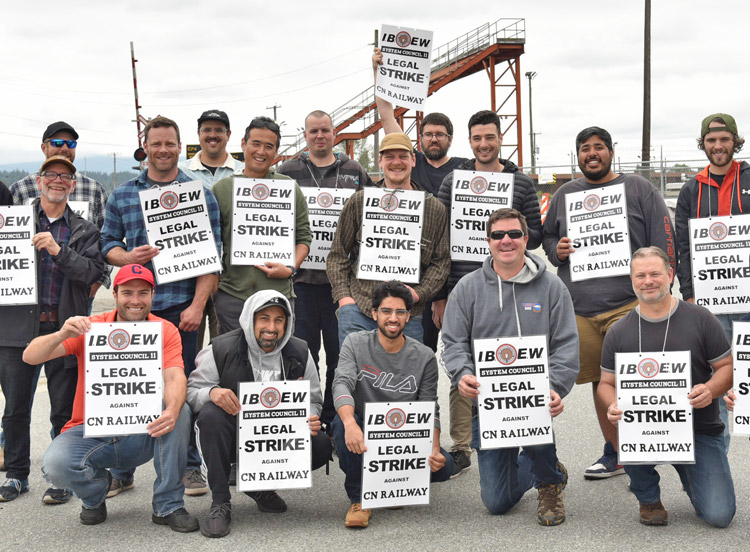MONTREAL — Some 750 signal and communications workers, members of the International Brotherhood of Electrical Workers, went on strike against the Canadian National Railway June 18 after negotiations broke down and the bosses demanded the union agree to submit unresolved issues to binding arbitration. Picket lines went up at rail yards from one end of Canada to the other two days later. The strike is the first by the union since 1997.
The workers play a critical role in the rail system, carrying out maintenance on track signals, at public crossings and on other rail infrastructure, making sure switches work properly, as well as responding to emergencies caused by weather, derailments and other unexpected developments.
Here in Montreal some 40 determined strikers formed a lively picket line at the entrance to Taschereau yard. They picketed in a disciplined manner, crossing the street whenever the traffic light turned green. This slowed truck container traffic coming out of the yard.
“You were blocking the traffic all across the yard!” Canadian National train conductor Jonathan Chiasson told the strikers when he joined the line at the end of his shift. Four CN train conductors, members of the Teamsters union; and a track maintenance worker, a member of the Unifor union, joined strikers picketing during the day.
As of now, IBEW strikers are not trying to shut down Canadian National rail operations. CN bosses are continuing to run trains, saying they’ve put in place “contingency plans” to use management personnel and contractors to take over IBEW members’ work. This is dangerous for all rail workers and people who live near the tracks.
The pickets were reinforced by some 15 Rolls-Royce aircraft strikers, members of the CSN (Confederation of National Trade Unions), who were locked out by their bosses almost four months ago. Their picket lines are just a few blocks away. They learned about the Canadian National signal workers strike that morning and decided to march over to express solidarity.
Others came to show their support, including Chris Hoeppner, a train conductor on CSX and member of the SMART-Transportation Division union in Philadelphia. Hoeppner is also a Socialist Workers Party candidate for U.S. Congress.
The city cops rapidly joined CN’s private police force in seeking to restrain the strikers from slowing down traffic, threatening them with fines and taking over manual control of the traffic lights.
The action had a big impact on workers who participated. “This is my first time on strike,” Jair Moreno, a quality inspector for four years at Rolls-Royce, told the Militant. Rolls-Royce picket captain Steve Mayer, who organized the CSN delegation, said that “through the union solidarity we have received during our lockout, we learned what solidarity is. That’s why we are here.”
The IBEW is demanding a 15% wage increase over three years, while the bosses have offered only 8%. The official inflation rate in Canada has been 6.8% this year alone.
Proposed schedule changes are a key question. Canadian National is demanding workers take work assignments in territory covering half the country. Up to now assignments were confined to the provinces in which they lived. Workers’ schedules will be set at seven days working and seven days off. The bosses are refusing to pay workers for travel time to get to work assignments on their days off.
Safety is also an issue. In Vancouver, British Columbia, strikers told Militant worker-correspondents that working in the avalanche prone Rockies is getting more dangerous, as CN bosses have been cutting the number of workers.
The short articles that have appeared in the big-business media echo the employers’ efforts to turn workers and farmers against the strike. The Toronto Globe and Mail, the country’s largest circulation daily, complained June 19 that the strike “threatens to exacerbate transport bottlenecks across the country.” The next day the Wall Street Journal asserted that recent “disruptions have increased transportation costs and raised concerns about increased food prices for consumers at a time global food security has been threatened by the war in Ukraine, a major supplier of agricultural goods.”
Strikers organized a rally in front of Canadian National’s downtown headquarters at Montreal’s main train station June 21, carrying picket signs and distributing a leaflet explaining the stakes in their fight. It pointed out that from 2019 to 2021 CN raked in over $17 billion in profits. “CN wants to raise the profits of its shareholders,” the IBEW explained, “by holding back wage increases, and worsening the conditions for the working class.”
“A union victory will globally better the working conditions for all workers, whether they are unionized or not,” the union said, appealing for working-class support.
Show your solidarity! Join strike picket lines! Send support messages to IBEW System Council No.11, 119 Wheatland Dr., Cambridge ON N1P 1E2. Call (519) 622-2323. Email: ibewmartin@bellnet.ca.
Philippe Tessier is a train conductor at Canadian National and member of Teamster Canada Rail Conference Division 89.


